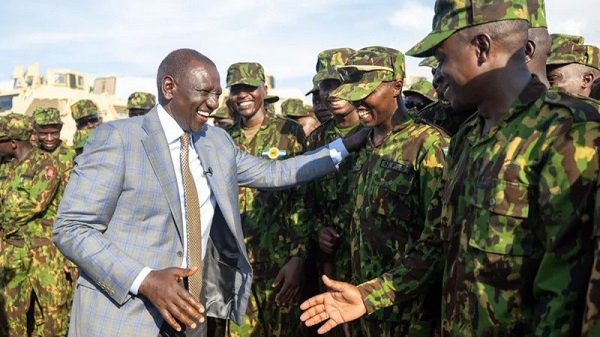Kenya has committed to sending an additional 600 police officers to Haiti in the coming weeks to assist in combating gangs that have taken control of much of the capital, Port-au-Prince, and surrounding areas.
This increase will raise the number of Kenyan personnel, who have been deployed gradually since June to support Haiti’s struggling police force, to a total of 1,000.
During a visit to Haiti, President William Ruto expressed his support for transforming the current Kenya-led security initiative into a comprehensive United Nations peacekeeping operation.
Several other nations have also pledged to contribute at least 1,900 additional troops.
The situation in Haiti remains volatile, with a UN human rights expert warning that gangs are expanding their reach into new territories, resulting in further displacement.
The UN Security Council is expected to meet by the end of the month to consider renewing Kenya’s existing mandate for another year, which could pave the way for a full UN mission in 2025.
This development would enhance funding and resources for the operation, which has faced challenges due to inadequate equipment.
While addressing the Kenyan officers at their base in Port-au-Prince, President Ruto praised their achievements over recent months.
“There are many people who thought Haiti was mission impossible, but today they have changed their minds because of the progress you have made.”
He expressed confidence that they would prevail over the gangs and committed to seeking improved equipment for them.
The nearly 400 Kenyan officers on the ground were going out on patrol “working hand-in-hand with Haitian forces to protect the people and restore security”, Ruto said.
“Our next batch, an additional 600, is undergoing redeployment training. We will be mission-ready in a few weeks’ time and look forward to the requisite support to enable their deployment,” he added.
Nonetheless, there has been criticism in Haiti regarding the absence of a decisive action against the gangs.
A UN human rights expert who recently visited the area stated that the mission is under-equipped and requires helicopters, night vision goggles, and drones.
“The Multinational Security Support Mission (MSS), authorised by the UN Security Council in October 2023, has so far deployed less than a quarter of its planned contingent,” William O’Neil said on Friday.
The smuggling of arms and ammunition into the country persisted despite an international embargo, enabling gangs to expand their influence into new regions, he noted.
The UN expert, who traveled to the southeastern part of the country, reported that the police lacked the logistical and technical resources needed to combat the gangs effectively.
He quoted a policeman in Jérémie as saying: “The situation borders on the impossible. We have to learn to walk on water.”
Sexual violence had drastically increased and more than 700,000 people were now displaced, Mr O’Neil said.
“This enduring agony must stop. It is a race against time.”
He said the solutions already existed, but efforts had to be “redoubled immediately”.
“It is crucial to stifle the gangs by giving the MSS Mission the means to be effective in supporting the operations of the Haitian National Police, as well as to implement the other measures provided for by the United Nations Security Council, including the sanctions regime and the targeted arms embargo.”

